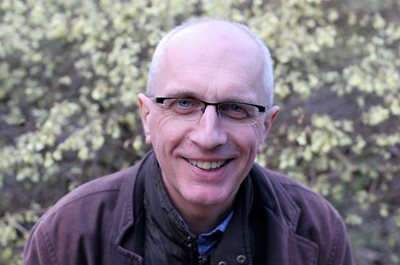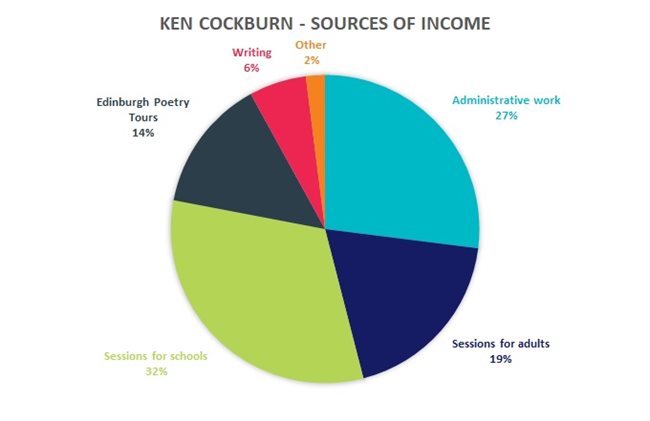Earlier this year I published a collection of poems, Floating the Woods, with Luath Press. In an Afterword, I outlined my situation: ‘I’ve worked freelance as a poet for over a decade now. That doesn’t mean I spend my time writing poems – in fact to make a living I’m kept busy running workshops in schools and community settings. But from time to time I’ve received commissions, or made my own writing opportunities, and this book gathers together the resulting poems, almost all written with a public outcome in mind.’ (Incidentally, I didn't receive an advance for the book.)
I began my career in the mid-1980s in arts administration, working for theatre companies, art galleries and a literature project, mostly as a salaried employee, but with a period of freelance work. I started writing and publishing poems in magazines, and gradually realised that was where my main interest lay. When in 1996 the job of Fieldworker with the Scottish Poetry Library came up I applied and was lucky enough to be offered it. It was a part-time post, and allowed me to engage with poetry on a day-today basis – I drove around Scotland with a van full of books, presenting poetry to all ages and stages. I supplemented that job with other work including, thanks to a generous Scottish Arts Council lottery grant, pocketbooks, a small publishing company I co-founded and ran with Alec Finlay, which we described ambitiously as ‘a contemporary generalist vision of Scottish culture’.
 Over time the SPL job became almost full-time, and new opportunities emerged via pocketbooks, and I realised I couldn't continue doing both in the same way. In 2004 I left my job at the SPL to freelance, initially working on book projects for both organisations, before gradually branching out and developing other partnerships. In my first full year as a freelancer (2005/06) I had a net income of just over £20k, then in my second it fell sharply to £8.5k. While it has steadied since it hasn’t risen above that initial figure; in the past three years I have averaged about £17.5k.
Over time the SPL job became almost full-time, and new opportunities emerged via pocketbooks, and I realised I couldn't continue doing both in the same way. In 2004 I left my job at the SPL to freelance, initially working on book projects for both organisations, before gradually branching out and developing other partnerships. In my first full year as a freelancer (2005/06) I had a net income of just over £20k, then in my second it fell sharply to £8.5k. While it has steadied since it hasn’t risen above that initial figure; in the past three years I have averaged about £17.5k.
For the year 2017/18, my earnings broke down as follows:
Administrative work, 27%
Sessions for adults, 19%
Sessions for schools, 32%
Edinburgh Poetry Tours, 14%
Writing, 6%
Other, 2%

As I wrote above, much of my income comes from poetry sessions in schools and community settings. These are often one-off, but sometimes are part of longer-term, or recurring projects. I was involved for several years with Living Voices, run by the SPL and Scottish Storytelling Centre, which involved working with care home residents and staff. (Latterly I also administered the project.) Each autumn since 2006 I’ve run World War One sessions for schools at Edinburgh Castle, where the Scottish National War Memorial is located; the setting is a wonderful stimulus for writing. A spin-off from the schools work is that I’ve written online poetry resources for teachers, for annual events like National Poetry Day, and one-off events like the London Olympics.
Over the years I continued to work with Alec Finlay, who is a great generator of ideas. Our largest and most fruitful collaborative project was The Road North, a journey around Scotland guided by Basho’s oku-no-hosomichi (Narrow Road to the Deep North), which resulted in an extensive blog, exhibitions, talks and readings, and a long poem published in book form (by Shearsman) as as audio (on iTunes). It was possible thanks to a Creative Sparks Award from Creative Scotland, a one-off fund geared towards collaborative projects.
I often work with visual artists, sometimes on public art commissions which can be relatively well funded. I collaborated with sculptor Mary Bourne on River Connections in Inverness, works which formed part of a new flood defence system, and with artists ~in the fields on several projects, including a book, Ink, a couple of exhibition pieces, and a schools project. Most recently I contributed poems to a book project about the Isle of Jura, Gleann Badraig, by the photographer Charles March, who contacted me out of the blue, thanks in part, I think, to a poem I’d written many years before about the island.
My website has the strapline ‘Poems on the page and in the world’, and I enjoy devising, or being offered settings in which to publish – ie make public – poems. Those in Floating the Woods first appeared in various forms – as booklets or recordings made for exhibitions, on blogs (my own and those of others), and in gardens and parks, carved on benches or attached to trees as botanical labels.
In recent years I’ve developed Edinburgh Poetry Tours, guided walks in the city’s Old Town during which I read poems about the various sites we visit. I run these during the Edinburgh Fringe, when the city is full of visitors, and take the ticket money. After costs (and as I live in the city they are kept to a minimum), I probably only clear about £400, but it’s been a good way to develop the tours and an audience for them. At other times of year I offer private tours, and am sometimes commissioned to lead bespoke tours, as in 2017 when I was asked by the Palace of Holyroodhouse to lead Jacobite-themed walks linked to an exhibition at the Museum of Scotland.
There was a period a couple of years ago when I was paid to attend several day-conferences, for organisations in the field of care. My task was to write as the sessions unfolded, and at the end of proceedings to read a poem summarising what had taken place. I tended to focus on more throwaway, spontaneous comments, which linguistically and imaginatively were richer rather than material from prepared speeches. The pressure of time concentrated the mind, not always to the poem’s benefit, but the great thing was that audience members got the references, and were tickled to hear how their own and their colleagues words had been caught and framed.